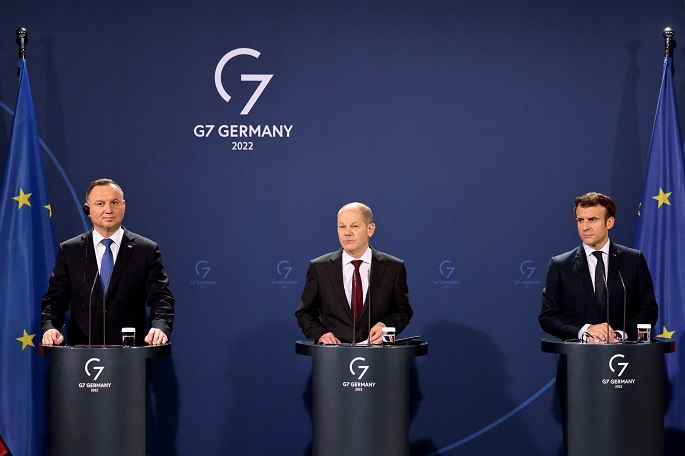Scholz, Macron and Duda united front in Russia-Ukraine crisis
Published : 09 Feb 2022, 23:42
The leaders of Germany, France and Poland said they were united in the goal of preventing war in Europe as a diplomatic push to resolve the Ukraine crisis moved to Berlin on Tuesday, reported dpa.
German Chancellor Olaf Scholz and presidents of France and Poland Emmanuel Macron and Andrej Duda underscored that "any further military aggression by Russia against Ukraine will have massive consequences and severe costs" in a joint statement issued after the talks.
The three leaders also called on the Kremlin to engage in "meaningful dialogue" on European security.
Duda and Macron travelled to the German capital on Tuesday to hold evening talks with Scholz on the crisis, which has seen Russia amass military hardware and more than 100,000 troops near Ukraine's border in recent weeks.
In a joint presser ahead of the talks, Scholz, fresh from his meeting a day earlier with US President Joe Biden, promised again that there would be "far-reaching consequences" for Russia should it invade Ukraine.
The impact on Russia would be "political, economic and certainly geostrategic," he said. But, in a pattern that has frustrated allies, Scholz did not offer any specifics in terms of possible sanctions.
Duda, whose country borders Ukraine and Belarus, said the continent was facing its most difficult challenge since the events of 1989.
"We have an unprecedented concentration of Russian troops along the Ukrainian border, we also have large groupings [of Russian soldiers] in Belarus, where military exercises are currently being held and are expected to last until February 20," Duda said alongside Scholz and Macron. "We are all wondering what will happen after that."
"The most important thing is unity and solidarity. We must show that we speak with one voice, that we are a community, that we cannot be broken - and I believe we must also show that we are not backing down."
Scholz told reporters before going into the meeting with Macron and Duda: "Our common goal is to prevent a war in Europe."
Macron came to Berlin on the heels of a trip to Moscow on Monday, during which he held talks with Russian President Vladimir Putin that lasted over five hours, and Kiev on Tuesday morning, when he met Ukrainian President Volodymyr Zelensky.
While in Kiev, Macron said he believed that implementing the Minsk agreement is the only way to achieve peace and maintain Ukraine's territorial integrity.
The agreement was negotiated in Belarus' capital in 2015 and is aimed at ending the seven-year conflict in eastern Ukraine between government troops and pro-Russian separatists.
The plan has long stalled and the sides often don't even agree on its terms. But Macron said getting the deal into force could lead to a stabilization of the situation and enable the start of a lasting de-escalation.
During Scholz's White House visit, Biden stressed that Germany remained an important partner.
Doubts have emerged due to Berlin's strong economic ties to Russia, especially the Nord Stream 2 gas pipeline project, which the US and Eastern European nations have strongly criticized. Scholz's centre-left government has also been criticized for its reluctance to send arms to Ukraine.
Speaking alongside Scholz, Biden vowed to "bring an end to" Nord Stream 2 if Russia were to invade Ukraine.
It remains unclear whether Berlin has made a similar commitment, although Germany's foreign minister suggested last month that the undersea project may not become operational should Russia invade its neighbour.
Nord Stream 2 would link Western Europe with Russian gas reserves via a connection on Germany's Baltic coast. The project is completed but regulatory certification is still pending in Germany, meaning no gas is flowing.
Tensions between the West and Russia have escalated due to a build-up of tens of thousands of Russian troops along Ukraine's borders, prompting fears that Moscow could be planning an invasion similar to its 2014 annexation of Ukraine's Crimean peninsula.
Russia has denied having any such intentions and accuses the West of scaremongering. It says moving troops and holding military drills on its territory is within its rights.


